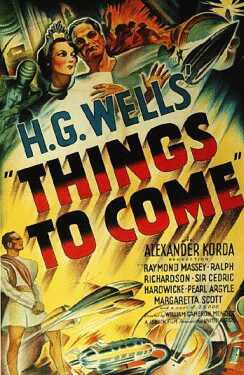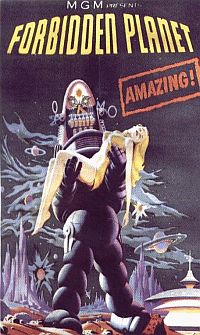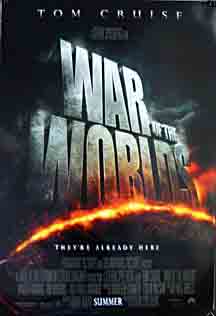![]()
Great SciFi Movie EndingsBruce G. Marcot
So many B-grade SciFi movies have had such trite and predictable endings that it seems appropriate not to turn to SciFi films for profound conclusions about life and the cosmos.
However, a few SciFi films stand out as reaching far beyond the pedestrian. Here are some examples.** Warning: some of the following material might contain plot spoilers. **
The Incredible Shrinking Man
One such film is 1957's "The Incredible Shrinking Man."
Despite its cliche-overtoned title, it had remarkable special effects for its day and treated its subject with as much dignity as could be expected. But the ending suddenly brought it into a new dimension of being, as with its ever-diminutive title character.
The movie could have ended with the hero somehow restored to his normal size to live a full life (OK, pun intended), or with the hero killed by a spider or house cat ... but the writer went far beyond with the final soliloquy, as the title character stepped through the screen mesh and into the raw jungle of lawn and soil. Against a zoom out that eventually encompasses stars and galaxies, the lead character utters the following:
Scott Carey: "I was continuing to shrink, to become...what? The infinitesimal? What was I? Still a human being? Or was I the man of the future? If there were other bursts of radiation, other clouds drifting across seas and continents, would other beings follow me into this vast new world? So close - the infinitesimal and the infinite.
But suddenly, I knew they were really the two ends of the same concept. The unbelievably small and the unbelievably vast eventually meet - like the closing of a gigantic circle. I looked up, as if somehow I would grasp the heavens. The universe, worlds beyond number, God's silver tapestry spread across the night.
And in that moment, I knew the answer to the riddle of the infinite. I had thought in terms of man's own limited dimension. I had presumed upon nature. That existence begins and ends is man's conception, not nature's. And I felt my body dwindling, melting, becoming nothing. My fears melted away. And in their place came acceptance. All this vast majesty of creation, it had to mean something. And then I meant something, too. Yes, smaller than the smallest, I meant something, too. To God, there is no zero.
I STILL EXIST!"
Metropolis
A very early movie with a terrific ending was Fritz Lang's 1926 visionary silent masterpiece "Metropolis." The ending scene is of the reconciliation between the mastermind overlord of the surface city and the leader of the underworld's laboring class that keeps the city functioning. To get them together, the leading lady of the film utters a famous aphorism.
If you noticed my opening page of The Plexus, I quote one version of this ending dialogue: "Between the plans of the mind and the tools of the hand there must exist a mediator, and this is the heart." I have seen several different prints of Metropolis and each seems to have its own version of this line.
In one print of the film, following this dialogue and after the final scene fades out, the words appear:
"The path to human dignity and happiness lies through the master of us all, the great Mediator, Love."
- Thea Von Harbou (author of the book Metropolis)
Things to Come

Another great sci-fi ending is to be found in the 1936 classic "Things To Come," Orson Wells' cinematic vision of the book classic by H.G. Wells' (no relation, but quite a coincidence).
"Things To Come" has been called cold, distant, intellectually contrived ... but it is truly one of the most remarkable early films, predicting the rise of savior technology from the ashes of terrible world wars. Like the more recent film "Contact," "Things to Come" explores the Cartesian division between science and faith, exploring the schism between universal technology and provincial tribalism. Its views of the perfect technocracy of 2036 must be viewed in the context of the 1936 film, but it also weirdly echoes today's "information age" progress.
In the final scene, the two proctors of the sci-tech society of the year 2036 are gazing upward to the heavens shortly after a projectile containing the world's first two astronauts has been launched into deep space. They speculate on whether science and technology should be driving society.
Raymond Passworthy: Oh, God, is there ever to be any age of happiness? Is there never to be any rest?And the final scene ends with the speaker again mouthing the final line, "Which shall it be?" in silence as the camera moves past him into the infinite realm of stars beyond.Oswald Cabal: Rest enough for the individual man -- too much, and too soon -- and we call it death. But for Man, no rest and no ending. He must go on, conquest beyond conquest. First this little planet with its winds and ways, and then all the laws of mind and matter that restrain him. Then the planets about him and at last out across immensity to the stars. And when he has conquered all the deeps of space and all the mysteries of time, still he will be beginning.
Raymond Passworthy: But... we're such little creatures. Poor humanity's so fragile, so weak. Little... little animals.
Oswald Cabal: Little animals. If we're no more than animals, we must snatch each little scrap of happiness and live and suffer and pass, mattering no more than all the other animals do or have done. Is it this? Or that? All the universe? Or nothingness? Which shall it be, Passworthy? Which shall it be?
Also, it is interesting that the character Oswald Cabal, played by actor Raymond Massey, is named "cabal," which means "a plot to carry out some harmful or illegal act, especially a political plot" ... fitting the character's support of science and technology despite the public's revolt against it at the end of the film.
Forbidden Planet

The 1956 classic scifi film "Forbidden Planet" was surely one of the major sources of material for Star Trek and many other scifi films to come.
As is well known, it is loosely based on Shakespeare's 1611 play The Tempest.
Here are some parallels between Forbidden Planet and The Tempest:
Forbidden Planet The Tempest set on a remote planet, Altair 4 set on an island in the Meditteranean Sea the main character Morbius is a super-intelligent scientist (philologist) from Earth, living alone with his daughter Alta the main character Prosporo is a magician from Milan, living in exile with his daughter Miranda Robby the Robot the tamed spirit Ariel the (unnamed) "monster from the id," originally conjured by the lost Krell civilization the beast Caliban, original ruler of the island arrival of the Earth crew in their space ship arrival of shipwrecked dignitaries from Milan the Earth crew captain falls in love with the daughter one of the dignitaries falls in love with the daughter
Robbie the Robot, the futuristic parallel
to Shakespeare's spirit Ariel
The unnamed "monster from the id," the
scifi version of Shakespeare's Caliban
At the end of Forbidden Planet, the captain takes the daughter Alta into the space ship and, as they whisk away from Altair 4, they view its explosive demise caused by a nuclear chain reaction in the Krell furnaces deep within the planet. The final lines of the movie have the captain saying to Alta:
"Alta, about a million years from now the human race will have crawled up to where the Krell stood in their great moment of triumph and tragedy. And your father's name will shine again like a beacon in the galaxy. It's true, it will remind us that we are, after all, not God."
This is somewhat in parallel with Prosporo's closing lines in his epilogue, in The Tempest:
"...Now I want
Spirits to enforce, art to enchant,
And my ending is despair,
Unless I be relieved by prayer,
Which pierces so that it assaults
Mercy itself and frees all faults.
As you from crimes would pardon'd be,
Let your indulgence set me free."
7 Faces of Dr. Lao
This wonderful, cult masterpiece starred Tony Randall in 7 roles, as various characters of a weird traveling circus of the existential. (Actually, he played 8 roles if you also include his casual appearance in the circus audience!)
Local townspeople learn -- sometimes the hard way -- about the nature and purpose of their existence, by interacting with the bizarre characters of this sideshow reflection of their own lives.
In the final scene, Dr. Lao, the circus owner and "ringmaster" extolls his insights:
"Mike, the whole world is a circus if you look at it the right way. Every time you pick up a handful of dust, and see not the dust, but a mystery, a marvel, there in your hand, every time you stop and think, 'I'm alive, and being alive is fantastic!' Every time such a thing happens, Mike, you are part of the Circus of Dr. Lao."
What is remarkable about these ending lines is their relation to the philosophy of the ancient Chinese Lao Tzu in his Tao Te Ching. Lao Tzu has been called the father of Taoism, which is the nature of these ending lines of "7 Faces of Dr. Lao." Calling life a "circus" is a wonderful metaphor for Lao Tzu's Tao of life.
War of the Worlds (1953 and 2005 versions)

In 2005, the H.G. Wells novel War of the Worlds was (re)made into a movie. Much of the movie repeated scenes from the 1953 classic film and also from the book.The ending lines -- when the invaders die from germs to which humanity had coevolved an immunity -- were as follows:
"From the moment the invaders arrived, breathed our air, ate, and drank, they were doomed. They were undone, destroyed, after all of man's weapons and devices had failed, by the tiniest creatures that God in his wisdom put upon this earth. By the toll of a billion deaths, man had earned his immunity, his right to survive among this planet's infinite organisms. And that right is ours against all challenges. For neither do men live nor die in vain."
This was a slight variation in the ending lines from the original 1953 version:
"The Martians had no resistance to the bacteria in our atmosphere to which we have long since become immune. Once they had breathed our air, germs, which no longer affect us, began to kill them. The end came swiftly. All over the world, their machines began to stop and fall. After all that men could do had failed, the Martians were destroyed and humanity was saved by the littlest things, which God, in His wisdom, had put upon this Earth."
The Day The Earth Caught Fire (1961)
The intensity of this wonderfully-constructed story speaks to today's world more than ever ... with its allegory of climate change and global warming.
Not to fully reveal the superb ending, the ending lines, with the hero walking alone into the abandoned city streets to meet the fate of Earth, are as much poetry as prose:
"So man has sown the wind and reaped the world.
Perhaps in the next few hours there will no remembrance of the past and no hope for the future that might have been.
All the works of man will be consumed in the great fire after which he was created.
But perhaps at the heart of the burning light into which he has thrust his world, there is a heart that cares more for him than he has ever cared for himself.
And if there is a future for man, insensitive as he is, proud and defiant in his pursuit of power, let him resolve to live it lovingly, for he knows well how to do so.Then he may say once more: truly the light is sweet, and what a pleasant thing it is for the eyes to see the sun."
The Time Travelers (1964)
A team of scientists opens a viewing window to the future, but discovers it is actually a physical portal.
They step through it and discover a world of the distant future (well, 2071, not that far away...) where humans have split into two races, one intelligent hiding below ground, and the other vicious and primeval inhabiting the surface. (Hmm, this inverts H.G. Wells' The Time Machine plot of the vicious moolocks underground and the passive Eloi aboveground.)
Caught in the future time period, the scientists build another time portal and return to their own time ... only to find themselves nearly frozen in time and about to discover the original portal for the first (?) time.
They revive themselves, only to repeat the entire episode, unknowing that they had already lived it.
And the movie -- very period-dated, campy, and low-budget -- suddenly ends in a spectacular whirlwind of accelerating snippets of the scientists' entire adventure, repeated over and over ... as if they are caught in a vortex of time, spiraling ever faster to some temporal singularity, and ...
That is where the move abruptly ends!
![]()
Back to the Sci Fi Trivia Page
Back to the Knowledge Plexus Page